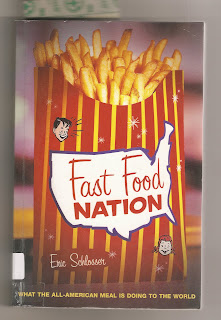How do we measure the value of a family meal? Who gets to make decisions about the quality and integrity of the food we eat? The World is not for Sale is a story of french farmers fighting against our food getting treated like an industrial commodity by faceless trade institutions.
They raise issues of genetic manipulation, cetralization and medicalization of food production. Their story starts in Millau, southwest France, on 12 August 1999 when they dismantled a partially constructed McDonald's in their town. They did this in response to America's trade barriers on their main export: Roquefort cheese, introduced in retaliation for Europe's refusal to import hormone-fed beef. The dismantling act was symbolic, non-violent and known to the local police. But mere 24 hours after the rally, McDonald's boss was in media claiming that a million francs worth of damage was caused and that the act was anti-American. Several farmers were arrested including Jose Bove who led the protest. He has since become the spokesman for Via Campesina member of European parliament and even ran for French presidency.
The World is not for Sale is an insightful book. Good read. The Jose Bove's story is vivid and his answers feel personal and genuine. But I can't help finding him somewhat idealistic. Can we, western consumers, all do niche-farming and pay more to get less? Globalization is already well on its way and some might argue, inevitable. On the other hand, if Bove can make money selling sheep's milk, so can we.
Naomi Klein says about the french farmers in the preface:
'For them, food is more than bodily fuel; it is a ritual, relationship, family, love, tradition, and so much more'.
This quote should be written on all junk-food packaging.
-----------------------------------
Erick Scholosser - Fast Food Nation
Not that long ago, I read an article somewhere on hormone-induced meat where it stated if the hormone-fed beef is good enough for Americans, it should be good enough for us. This book gives some answers.
Every day in the US, roughly 200,000 people are sickened by a food borne disease, 900 are hospitalised, and fourteen die. According to the Centers for Disease Control and Prevention, more than a quarter of the American population suffers from food poisoning each year. Schlosser talks about Beef Trust, cattle breeding, E.coli and hamburgers, the fact that American kitchen sinks have on average more bacteria than American toilet seats etc. It's an entertaining account of where food comes from but at the same time, feels exaggerated. It must be the selection of stories - all shocking to extend. After a while it feels -too much. However, it's a good read and if it could change the way we eat, putting us off those 'tasty' burgers, that so be it.
---------------
BBC - Super Size Ambulance
Every third Briton is now overweight or obese and in desperate need of hospital treatment. A new kind of patient has led to a new kind of ambulance service. The Thames Ambulance 's bariatric service is now equipped to treat patients weighting up to 70 stones.
This documentary is a moving story of four morbidly obese and their families. The impact the illness has had on their lives in most cases is catastrophic.
John`s life is a far cry from 12 years ago. He saw active service in both Ireland and Falklands. But now, he weights nearly 40 stone and needs an extra size stretcher and help of 5 men to get into his own house. We don't find out what led to John gaining all the weight but one thing is clear. He doesn't like whom he's become and leading his life in constant pain from obesity related illnesses is wearing him down.
Alex, 62, who is 30+ stone, says, 'My life fell to pieces in the last four years, I'm married but I have no sex life, my skin is just rotting away, my penis has gone up inside me and I've got to pee on the floor like a dog'. Then later, when wheeled out of hospital, someone asks him if he looks forward to going home. He answers, 'Give me one of them lethal injections'.
Another patient, Debbie, 33 and weighing 37 stone says 'the only time I look into a mirror is in hospital when I'm in the lift. I close my eyes as soon as I go in there'.
We know that obesity and depression go hand in hand, but sometime it's unclear which is cause and which is effect. While researchers are still looking for the link between the two, there is no doubt that majority of the people in this program are depressed (some severely). Throughout the documentary we see patients receiving medical help, being consulted on stomach stapling and other weight loss surgeries, treated for painful lymphodemas. Not a single patient received any mental support or counseling for depression. It's almost ridiculous that we spend millions of pounds on treatment for obesity related conditions (Over the past year, the number of people having a weightloss surgery on NHS has gone up by 70%), but refuse to look for causes. People with eating disorders have low-self esteem and that's part of the reason they stay in-doors, don't go out or socialise. Lack of exercise and eating comfort foods then inevitably leads to weight gain. In the current economic climate, NHS should consider looking after mental health of their obese patients rather than offering expensive surgical options. After all it's about how people feel and how they feel about themselves.
http://www.bbc.co.uk/iplayer/episode/b011k479/Super_Size_Ambulance/


No comments:
Post a Comment